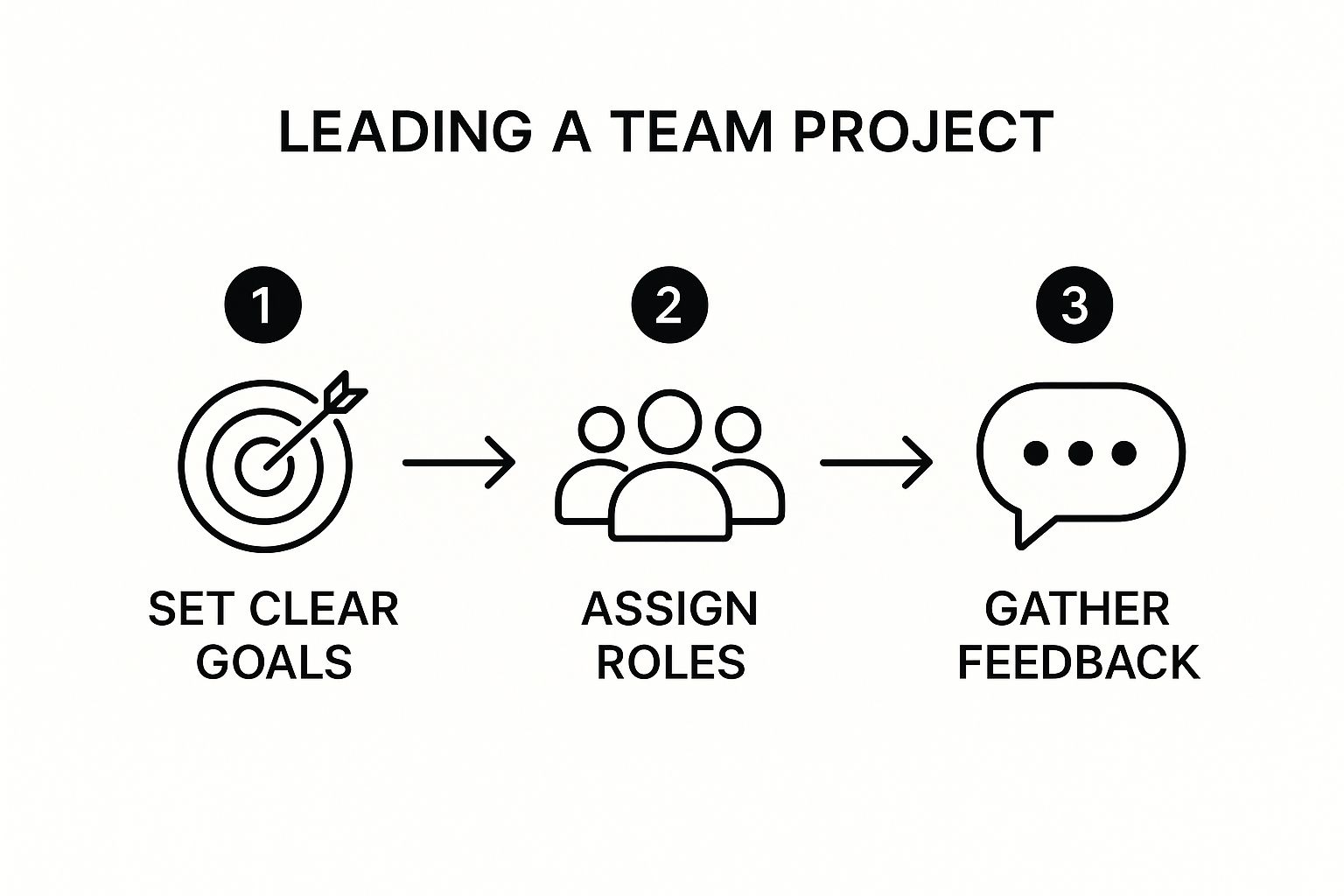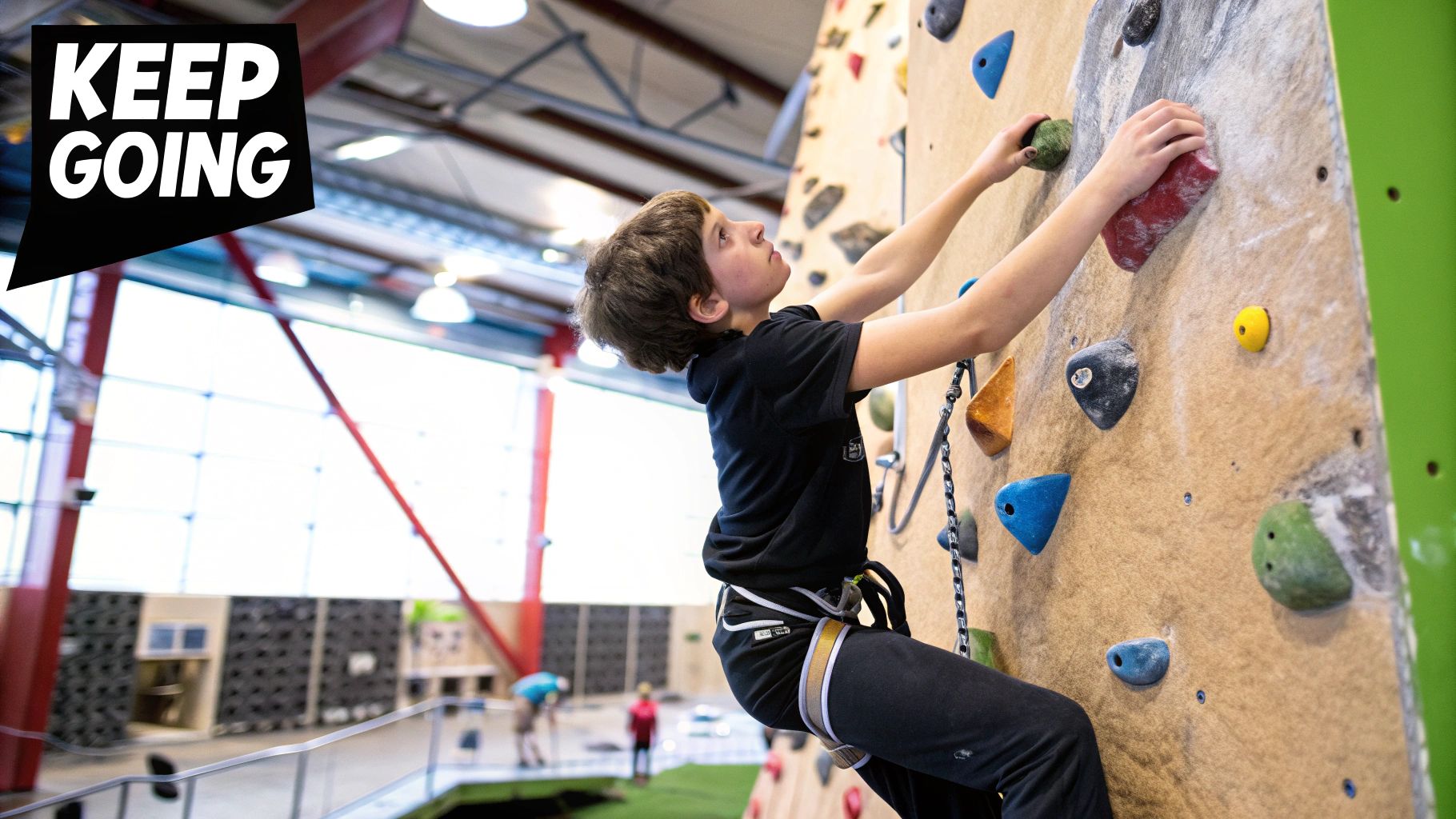Leadership for teens isn’t what most people think. It’s not about being the loudest person in the room or having a fancy title. Real leadership is about developing skills that actually matter in the real world—like listening so people feel heard, taking the first step when no one else will, and helping your friends figure out tough problems.
It’s something anyone can learn. These skills aren’t just for school projects; they’re for navigating friendships, handling challenges at home, and figuring out who you want to be. It all starts with small, consistent actions that show people you’re reliable, you care, and you’re ready to make a difference, even in your own small way.
What Teen Leadership Actually Looks Like
Forget the image of a politician at a podium or the star quarterback giving a speech. For teenagers, leadership is almost never that dramatic. It’s found in the quiet, everyday moments. The small decisions you make that build trust, show you’re responsible, and spark a little bit of positive change around you.
Modern leadership is built on collaboration, empathy, and influence—not old-school authority. It’s about listening to understand what someone is really saying, not just waiting for your turn to talk. It’s being the one to say, “Okay, how about we start with this?” on a group project when everyone else is staring at their phones. It’s pushing through procrastination on your homework, not just for the grade, but because you know your study group is counting on you.
Redefining Leadership Beyond Titles
The pressure to “be a leader” can feel huge, especially when everyone thinks it means being class president or captain of the team. But honestly? The most powerful leadership often happens when there’s no title at all. It’s a mindset that comes from knowing yourself and genuinely wanting to contribute.
This is especially true for your generation. You’re more driven to make a difference than ever before. In a Global Shapers Impact Report 2025 that surveyed nearly 4,000 young leaders, 83% see the world as full of opportunities. An incredible 74% feel empowered to tackle global issues. That tells me teens are fired up and ready to lead with a sense of optimism and a can-do attitude.
Parenting Tip: Help your teen find ways to lead that actually connect with what they love, not just what looks good on a college application. Encourage them to lead a study group for a subject they’re good at, organize a cleanup at a local park, or even take charge of planning family dinners for a week. Celebrate the action, not the title.
It’s easy to get stuck on old ideas about what a leader should be. Here’s a quick look at how things have shifted.
Modern Teen Leadership Myths vs Realities
| Common Myth | Modern Reality |
|---|---|
| A leader is the loudest, most commanding person. | A leader is often the best listener who unites different voices. |
| Leadership requires a formal title (e.g., captain, president). | Leadership is an action you take, with or without a title. |
| Leaders have all the answers. | Leaders ask great questions and empower others to find solutions. |
| It’s about being in charge and giving orders. | It’s about collaboration, influence, and inspiring others. |
| Leadership is for extroverts. | Introverts make powerful leaders through observation and empathy. |
The takeaway? Leadership is a skill set, not a personality type.
The Connection to Mental Health and Motivation
Here’s something that doesn’t get talked about enough: developing leadership skills is a massive boost for your mental health and motivation. When you feel capable and see your actions making a positive difference—even a small one—it builds real self-esteem and a sense of purpose.
That feeling of competence is a powerful antidote to the anxiety and self-doubt that so many teens wrestle with.
Successfully guiding a project or just helping a friend get through a tough week proves to your brain that you can handle challenges. That builds resilience. And that confidence spills over into everything else, especially school. A teen who feels like a leader is more likely to see homework not as a boring chore, but as a stepping stone toward a bigger goal.
If you’re looking for more support on this front, check out great resources like The Jed Foundation and Teen Mental Health. They offer solid guidance for navigating these pressures.
Building Your Inner Foundation of Confidence

Before you can lead anyone else, you have to know how to lead yourself. Real leadership doesn’t come from a title or a team captain’s armband—it grows from a solid inner foundation of self-awareness and genuine confidence.
This isn’t about being the loudest person in the room or pretending you have all the answers. It’s about getting honest with yourself. It’s about knowing who you are, what you stand for, and what actually drives you.
When you have that self-knowledge, it becomes your anchor. It gives you the stability to make good decisions, even when things get messy. This is what helps you navigate the ups and downs of school, friendships, and your own goals.
Uncovering Your Strengths and Passions
First things first: let’s figure out what makes you tick. What are you naturally good at? What gets you fired up? It’s funny—sometimes our biggest strengths are the things we do so naturally we don’t even notice them.
To get started, grab a notebook and give yourself about 15 minutes for this exercise. No overthinking, no judgment. Just write down whatever comes to mind for these questions:
- What activities make you completely lose track of time? This could be anything from coding and gaming to playing guitar or shooting hoops.
- What do friends or family always ask for your help with? Maybe you’re the person they call for tech support, the one who gives great advice, or the one who can explain a tough concept from class.
- What’s one thing you’ve done, big or small, that you’re really proud of? Think about the skills you had to use to make it happen.
- If you had a totally free Saturday with zero obligations, what would you actually do?
This isn’t just about listing hobbies. It’s about spotting the skills and passions that fuel you. Recognizing these is the bedrock of real, authentic confidence.
From Procrastination to Purpose
Motivation can feel like a total mystery, especially when you’re stuck procrastinating on a project. We’ve all been there—overwhelmed by a mountain of homework or a personal goal that feels too big.
Here’s a secret: we usually don’t put things off because we’re lazy. We do it because the task feels huge, or we’re secretly afraid of not doing it perfectly.
The best way to fight this is to connect with your “why.” When a task is linked to something you genuinely care about—like a personal goal, helping a friend, or learning a cool new skill—it stops feeling like a chore. Your “why” can turn a boring assignment into a stepping stone.
I’m seeing a major shift in what motivates young people today. Getting a fancy leadership title isn’t the main goal anymore. Instead, the focus is turning inward—toward personal growth, learning, and finding a life that feels balanced.
This isn’t just a hunch; the data backs it up. A huge survey of over 23,000 young people found that only 6% of Gen Z see reaching a leadership position as their top career priority. This shows a powerful trend where personal fulfillment is becoming the new success. You can see more on this in the 2025 Deloitte Global Gen Z and Millennial Survey.
Prioritizing Your Mental Wellness
Let’s be real: the pressure to do well in school, keep up with friends, and figure out your future is intense. That’s why any conversation about leadership for teens has to include mental health. Confidence is fragile. You can’t lead effectively if you’re running on empty.
Knowing when you need support is a sign of incredible strength, not weakness. A huge part of this is developing strong emotional intelligence—the ability to manage stress and understand what you truly need. If you’re feeling consistently overwhelmed, anxious, or just down, reaching out is one of the most important leadership moves you can make. You can learn more about strengthening this skill through emotional intelligence coaching.
Trusted Mental Health Resources for Teens:
- The Trevor Project: Provides crisis support and suicide prevention services for LGBTQ youth.
- Crisis Text Line: Offers free, 24/7 confidential help via text. Just text HOME to 741741.
- NAMI (National Alliance on Mental Illness): Has great educational resources and support for teens and families dealing with mental health challenges.
Parenting Tip: Your job is to create a safe space for your teen to figure out who they are, without pressure. The goal is to foster independence, not force it. Encourage them to take small, manageable risks and be there to support them, win or lose. Celebrating their effort and resilience is what builds true, lasting confidence.
Developing Powerful Communication Skills

You can’t have great leadership without great communication. They’re two sides of the same coin.
And I’m not just talking about giving a killer presentation in class. I’m talking about the day-to-day stuff—the interactions that build trust, help solve problems, and make people genuinely feel heard. Honestly, developing this skill is one of the most powerful things you can do. It opens doors you don’t even know are there yet, from friendships to school projects and beyond.
This isn’t about faking a new personality. It’s about adding powerful tools to your toolbox. Think of it like this: if confidence is the engine, communication is the steering wheel. It directs that power where you want it to go.
Moving Beyond Just Talking
We usually think communication is all about talking, but the most effective leaders I know spend way more time listening. It’s a skill called active listening, and it’s about hearing what someone is really trying to say, not just the words coming out of their mouth.
It means you’re not just waiting for your turn to jump in. You’re completely focused on understanding their side of things.
A huge piece of this puzzle is picking up on non-verbal cues. Some research suggests a massive part of what we communicate isn’t verbal at all. Are their arms crossed? Are they avoiding eye contact? These little signals can tell you way more than their words.
Parenting Tip: Create daily moments for real communication. At the dinner table, swap out “How was school?” for open-ended questions like, “What was the most interesting thing you learned today and why?” Then, put your phone down and give them your undivided attention. Modeling active listening is the single best way to teach it.
Communicating Clearly and Confidently
Once you’ve truly heard someone, you need to be able to share your own perspective clearly. This is a game-changer for group projects, hashing things out with friends, or even navigating disagreements at home. The goal is always clarity, not just winning an argument.
Here’s a simple, non-confrontational way to frame your ideas:
- Get straight to the point. Don’t bury your main idea under a pile of words.
- Explain your “why.” Briefly, why do you feel or think this way?
- Suggest a way forward. What do you think should happen next?
Let’s say you’re in a group chat for a school project and someone throws out an idea you think is a dead end. Instead of just texting, “That idea is bad,” try this:
“I’m a little worried that approach might get too complicated with the time we have left. What if we tried something simpler first, like focusing on Topic A, just to make sure we hit the deadline?”
See the difference? This shows you’re thinking about the team’s success, not just shooting down an idea. Learning to frame things constructively is a core leadership skill for teens.
Handling Procrastination and School Motivation
You might be surprised to hear that poor communication is often a hidden reason for procrastination. When you feel misunderstood or ignored in a group, it’s natural to check out. And if you’re not totally clear on what a teacher expects for a big assignment, the task can feel so massive that you avoid even starting.
Clear communication snaps that cycle.
Asking a teacher for clarification isn’t a sign of weakness—it’s a total leadership move. It shows you’re taking ownership. That kind of proactive communication can completely reboot your motivation for school.
When it comes to your mental health, feeling understood is everything. Bottling up stress or anxiety because you don’t know how to talk about it just makes things heavier. Learning how to simply say, “I’m feeling overwhelmed by this,” is a powerful act of self-leadership. For more on this, you can learn about developing teen communication skills.
Trusted Mental Health Resources for Teens:
- The Jed Foundation: They have fantastic, teen-focused resources for navigating the pressures of school and life.
- Crisis Text Line: This is a free, confidential service you can use 24/7. Just text HOME to 741741 to connect with a crisis counselor.
These are safe places to practice communicating what you’re feeling and get support whenever you need it.
Overcoming Procrastination and Finding Motivation
Let’s be honest—one of the biggest hurdles you’ll face on any leadership journey is the mental game. Every single teen I’ve worked with, no matter how sharp or capable, hits a wall with motivation-killers like procrastination and that paralyzing feeling of being totally overwhelmed.
It’s that moment when you’re staring at a huge school project or a personal goal and you have absolutely no idea where to even begin.
That feeling isn’t a sign of laziness. It’s almost always rooted in something deeper—a fear of failure, the weight of perfectionism, or just pure uncertainty about what the first step should be. Before you can lead others, you have to learn how to lead yourself through these moments. And it all starts with figuring out what’s really behind your urge to procrastinate.
The “Why” Behind Procrastination
Procrastination often gets a bad rap, but at its core, it’s just a coping mechanism. When your brain sees a task as threatening—because it’s too hard, too boring, or carries a high risk of failure—its go-to response is avoidance. This is especially true at school, where the pressure to perform is non-stop.
The secret to breaking this cycle isn’t just to “try harder.” It’s about outsmarting that avoidance instinct. When you break a massive, intimidating task into tiny, non-threatening steps, you trick your brain into getting started. The goal is to make the first action so ridiculously easy that there’s no good reason to put it off.
This is true for solo work and even more critical for group projects, where confusion can bring everything to a grinding halt.

The real takeaway here? Momentum starts with clarity. When everyone knows exactly what they’re supposed to do, the uncertainty that fuels procrastination disappears.
Actionable Strategies to Build Momentum
Motivation isn’t something you just wait around for. You create it with action. Building momentum, one small win at a time, is the single most effective way I’ve found to beat procrastination and stay on track.
Here are a few powerful, practical strategies you can use today:
- The 5-Minute Rule: This one is a game-changer. Commit to working on that task you’re dreading for just five minutes. The hardest part is almost always starting. Once you get going, you’ll often find it’s not as bad as you imagined and you’ll want to keep going.
- Create a Productive Space: Your environment has a massive impact on your focus. Designate one specific spot for schoolwork that is clean, organized, and—most importantly—free from distractions like your phone or the TV.
- Tame Your Digital Distractions: Be ruthless here. Use an app that blocks distracting websites for set periods. Better yet, just put your phone in another room while you work. Reducing temptation is half the battle.
To help you put these ideas into practice, here’s a simple action plan. Think of it as a roadmap for turning that overwhelming “I can’t” into a manageable “I will.”
Action Plan for Overcoming Procrastination
| Challenge | Actionable Strategy | Parenting Tip |
|---|---|---|
| Feeling Overwhelmed by a Large Project | Break it down into the smallest possible steps. Write them down. Focus only on completing the very first one. | Help your teen brainstorm the first 3-5 steps. Don’t plan the whole project, just the start. |
| Getting Distracted Easily | Set a timer for 25 minutes (Pomodoro Technique) and work without interruption. Then take a 5-minute break. | Encourage “tech-free” work blocks and respect that time. Model this behavior by putting your own phone away. |
| Fear of Not Doing it Perfectly | Give yourself permission to do a “bad first draft.” The goal is completion, not perfection, on the first pass. | Praise the effort and the process, not just the final grade. Say, “I’m proud of how hard you worked on that.” |
This table isn’t just a list of tips; it’s a framework for building habits. By consistently applying these strategies, you’re training your brain to approach challenges differently—with action instead of avoidance.
If you find yourself getting stuck over and over, it might be time for a deeper look at your habits. We’ve put together a full guide on how to stop procrastinating that dives into even more powerful techniques.
Connecting Motivation to Mental Health
Your ability to stay motivated is directly tied to your mental well-being. It’s just a fact. When you’re feeling stressed, anxious, or completely burned out, finding the energy to tackle even small responsibilities can feel impossible.
Sometimes, chronic procrastination isn’t about the task at all—it can be a sign of underlying mental health challenges that need attention.
Feeling constantly overwhelmed can chip away at your confidence, creating a vicious cycle of avoidance and anxiety. This is why self-compassion is such a critical leadership skill. It’s okay to struggle. It’s a sign of real strength to admit when you need support.
Prioritizing your mental health is the foundation for becoming an effective leader. Here are a couple of trusted resources that can help:
- The Jed Foundation: Offers fantastic resources specifically designed to support the mental health of teens and young adults.
- Teen Mental Health: Provides clear, science-based information on a whole range of mental health topics that are relevant to you.
Understanding that your motivation and mental health are two sides of the same coin is the first step toward building sustainable habits for success, both in school and in life.
Finding Real-World Leadership Opportunities

Okay, you’ve been working on your confidence and getting better at communicating. Now what? It’s time to take all that theory and put it into action. But the big question always is: where do you actually get a chance to lead?
The good news is, these opportunities are literally everywhere. You just have to know how to spot them.
First, we need to kill the old idea that leadership for teens means you have to be class president or the captain of the soccer team. Sure, those are great roles, but they’re not the only game in town. Not by a long shot.
Real leadership is about noticing a problem and being the first person to do something about it. It’s about making things better, not just adding a title to your college application. That’s a huge mindset shift. Stop asking, “How can I get a leadership position?” and start asking, “Where can I be useful?” This one little change will open up a world of possibilities right in your own school, community, or even at your part-time job.
Spotting Leadership Gaps in Your Daily Life
Leadership chances often hide in plain sight. They look like everyday frustrations or small problems. The secret is training your brain to see them as invitations to act, not just things to complain about.
Think about your school day. Are a bunch of your friends totally lost in algebra? There’s your opening. You don’t need a teacher’s permission to start a weekly study group in the library. Just send a few texts to get the ball rolling. When you’re the one explaining concepts and keeping everyone on track, you’re leading. It’s that simple.
Or look around your neighborhood. Does the local park look like a mess every Monday morning? That’s another opening. Grab a few friends and organize a quick weekend cleanup. This shows initiative and proves you care about your community—both are powerful leadership traits.
Parenting Tip: Help your teen learn to see these “leadership gaps.” When they complain about something, gently nudge them toward a solution. Ask questions like, “That sounds really frustrating. What’s one small thing you think could make it better?” This coaches them to see opportunities instead of just obstacles.
How to Start Small and Make a Real Impact
Starting something from scratch can feel like a huge deal, but it doesn’t have to be. The most powerful leadership often starts with small, consistent actions that create momentum.
Here are a few practical places to find—or create—your first leadership gigs:
- At Your Part-Time Job: Don’t just punch the clock. Ask your manager if there’s a nagging little problem you can own. Maybe the stockroom is a disaster, or maybe you could create a simple cheat sheet for training new hires. Taking initiative to fix something that makes life easier for everyone is a massive leadership move.
- In Your Friend Group: Be the planner. Instead of the endless “idk what do u wanna do?” text chain, be the one who suggests a plan, looks up the movie times, and gets everyone organized. That’s you practicing communication and organization.
- In Your Hobbies or Clubs: Notice the new person who looks a little lost? Make it your job to welcome them, show them the ropes, and introduce them around. Making people feel like they belong is the heart of great leadership.
A 2025 OECD report highlighted something interesting: lots of teens have big career goals but feel totally lost on how to get there. The research showed that participating in activities that build real-world skills is directly linked to better career success, including future leadership roles. But the report also found that not enough teens are actually doing it. You can learn more about these findings on teenage career preparation from the OECD.
Building a Story for Your Future
Every time you lead that study group, organize a small event, or take initiative at work, you’re doing more than just practicing a skill. You’re building your story.
These are the exact experiences that make you stand out on college applications, scholarship essays, and your first real resume.
Trust me, admissions officers and hiring managers are way more impressed by the student who saw a need and built something from scratch than by someone who just held a title. When you can describe how you found a problem, got others on board, and worked to fix it—that shows maturity, drive, and the exact kind of person they want on their team.
Alright, let’s get into the nitty-gritty of what it really means to be a leader as a teenager.
It’s a journey, and like any good adventure, it comes with a ton of questions. You might be wondering where to even begin, how to handle the pressure without burning out, or what to do if you don’t feel like the “leader” type at all.
Let’s tackle some of the biggest questions I hear from teens and their parents.
“But I’m Shy. Can I Still Be a Leader?”
Let’s clear this up right now: introverts make incredible leaders. This is one of the most common myths I see, and it holds so many talented teens back.
Leadership has nothing to do with being the loudest person in the room. It’s about influence. And introverts have some seriously powerful, unique ways of making an impact.
Quiet leadership is a superpower. It’s about careful observation, deep thinking, and building real, one-on-one connections. While an extrovert might be great at hyping up a crowd, an introvert is often the one who truly listens, notices what everyone else missed, and drops a thoughtful, game-changing idea.
Here’s how to play to your strengths:
- Lead with Your Words (on Paper): Are you way better at writing than speaking on the spot? Perfect. Volunteer to take meeting notes, draft the group project proposal, or run the team’s group chat. This gives you space to shape the conversation without having to fight for the spotlight.
- Become the Go-To Expert: Get really, really good at something you love. When you’re the person who has the answers, people naturally start looking to you for guidance and direction.
- Lift Others Up: Your quiet observation skills are perfect for this. You notice when someone on the team has a great idea but is too hesitant to share it. A simple, “I think Sarah’s onto something with that idea,” can be more powerful than a loud speech.
Parenting Tip: Acknowledge and praise your teen’s quiet strengths. Say things like, “I noticed how you really listened to your friend today, that was very kind,” or “That was a really thoughtful question you asked.” This helps them see their introverted traits as the assets they are.
“How Do I Juggle Leadership With School, Friends, and Everything Else?”
This is a big one. Feeling like you’re already drowning in homework, extracurriculars, and just trying to have a social life is completely normal. The thought of adding one more thing can feel impossible.
Here’s the secret: balancing leadership isn’t about cramming more into your day. It’s about being smarter and more intentional with the time you already have.
The same skills that help you avoid procrastinating on that massive history paper are the ones that will help you lead without getting completely burned out.
Try these practical steps:
- Integrate, Don’t Add. Look for leadership opportunities inside things you already do. Can you lead a study group for your toughest class? Take on a bigger role in that club you already love? Suggest a better way to do things at your part-time job?
- Use a Planner (Seriously). Block out time for everything—classes, homework, leadership tasks, and especially your downtime. When you can see your commitments laid out, it’s way easier to spot when you’re overbooked and to say “no” to things that just won’t fit.
- Learn to Delegate. A true leader doesn’t do it all themselves. Your job isn’t to carry the entire team on your back; it’s to empower everyone to do their part. Assigning tasks actually builds trust and frees up your own mental energy for the big picture.
A quick tip for parents: Help your teen protect their rest time. Our culture screams “be busy!” all the time, but modeling that rest is productive is one of the most important lessons you can teach. Make sure their schedule has empty space to just relax and be a kid. It’s the key to avoiding burnout.
“What If I Procrastinate and Have Zero Motivation at School?”
It might sound strange, but taking on a small leadership role can actually help with procrastination and motivation.
Often, we put things off because we feel overwhelmed or disconnected from why it even matters. But when you’re suddenly accountable to other people—when they’re counting on you—it can light a fire under you in a way that grades sometimes can’t.
Think about it: if you organize a study group for a class you find boring, the act of helping others understand the material forces you to engage with it. Teaching a concept is one of the fastest ways to master it yourself.
If you struggle with motivation, start by looking at the root cause. It’s rarely about being lazy. More often, it’s a fear of failure or not knowing where to start. Break down that giant school project into tiny, non-scary steps. Use the 5-Minute Rule: just work on one thing for five minutes. You’ll be surprised how often the hardest part is just getting started.
Your mental health is also a massive piece of the motivation puzzle. Constant stress and anxiety will drain your battery fast. It’s crucial to have support.
Trusted Mental Health Resources for Teens:
- The Jed Foundation: An incredible resource focused on helping teens manage school pressure and emotional health.
- Crisis Text Line: This is a free, 24/7, confidential service. Just text HOME to 741741 to connect with a crisis counselor for immediate support.
Remember, asking for help isn’t a sign of weakness. It’s an act of self-leadership.
“Where Do I Even Start? I Have Zero Experience.”
Guess what? Everyone starts at zero. Every single leader you look up to started with no experience.
The secret is to start so small it barely feels like leadership at all. Don’t worry about becoming club president on day one. Just aim to be the most helpful person in the room.
Here’s your “no experience needed” starter pack:
- Be the Question-Asker: In your next class, when the teacher explains something confusing, be the one who bravely raises their hand and asks for clarification. I guarantee half the class is wondering the same thing.
- Be the Planner: In your friend group, be the one who turns “we should hang out sometime” into an actual plan. Find the movie times, pick a place to eat, and send the group text that makes it happen.
- Be the Welcomer: The next time a new student shows up in your class or joins your club, go introduce yourself. Show them where to go. Making one person feel included is a huge act of leadership.
The journey of leadership for teenagers starts with a single, small step. By doing these everyday things, you’re building a reputation for being reliable, thoughtful, and proactive. You’re practicing leadership in its purest form—one helpful moment at a time.
Are you or your teen ready to build the skills for a confident future? Andrew Petrillo Life Coaching provides one-on-one guidance to help teens overcome challenges like procrastination, anxiety, and low motivation. Learn how to transform overwhelm into action and unlock your true potential. Schedule your complimentary discovery call today.



















